|
|
|
Sort Order |
|
|
|
Items / Page
|
|
|
|
|
|
|
| Srl | Item |
| 1 |
ID:
123582
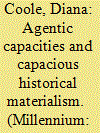

|
|
|
|
|
| Publication |
2013.
|
| Summary/Abstract |
In this article, I note that the idea of a new materialist turn has recently been gathering steam. The first part considers some of the signature elements of the new materialisms. The most distinctive aspect identified here is the invocation of a generative or vital ontology of immanence. Following discussion of some of its principal claims, the article draws out its implications for reconceptualising agency, in particular regarding the way agentic capacities are recognised to be distributed across animate, and perhaps also inanimate, entities. The significance of this development for the political sciences is then explored. In a second part, I suggest that the new materialism entails a normative project. Here, ethical overtures towards a new sensitivity predicated on vital materialist insights are contrasted with a renewed critical theory. The latter is commended as a material reckoning of the 21st century: a project provisionally labelled a capacious historical materialism.
|
|
|
|
|
|
|
|
|
|
|
|
|
|
|
|
| 2 |
ID:
145985
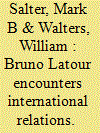

|
|
|
|
|
| Summary/Abstract |
Philosopher and sociologist Bruno Latour’s work on actor-network theory (ANT), science and technology studies (STS), and the politics of nature, has made a substantial impact upon the social sciences, and more recently, International Relations (IR). This interview records Latour’s first direct ‘encounter’ with IR, and explores concepts and topics as varied as sovereignty, the State of Nature, globality and spheres, the thought of Carl Schmitt, war and universalism, Gaia and climate politics, and the creation of publics, secrecy, and politics as a mode of existence. It provides new insight into Latour’s thinking and philosophy, while opening new avenues of research for IR scholars to pursue in the future.
|
|
|
|
|
|
|
|
|
|
|
|
|
|
|
|
| 3 |
ID:
157724
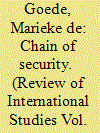

|
|
|
|
|
| Summary/Abstract |
Increasingly, private companies – including Twitter, airlines, and banks – find themselves in the frontline of fighting terrorism and other security threats, because they are obliged to mine and expel suspicious transactions. This analytical work of companies forms part of a chain, whereby transactions data are analysed, collected, reported, shared, and eventually deployed as a basis for intervention by police and prosecution. This article develops the notion of the Chain of Security in order to conceptualise the ways in which security judgements are made across public/private domains and on the basis of commercial transactions. Drawing on the work of Bruno Latour, this article understands the security chain as the set of practices whereby commercial transactions are collected, stored, transferred, and analysed, in order to arrive at security facts. Understanding the trajectory of the suspicious transaction as a series of translations across professional domains draws attention to the processes of sequencing, movement, and referral in the production of security judgements. The article uses the chain of financial suspicious transactions reporting as example to show how this research ‘thinking tool’ can work. In doing so, it aims to contribute to debates at the intersection between International Relations (IR) and Science-and-Technology Studies (STS).
|
|
|
|
|
|
|
|
|
|
|
|
|
|
|
|
| 4 |
ID:
131248


|
|
|
|
|
| Publication |
2014.
|
| Summary/Abstract |
Recent scholarship in critical security studies argues that matter matters because it is not an inert backdrop to social life but lively, affectively laden, active in the constitution of subjects, and capable of enabling and constraining security practices and processes. This article seeks to further the debate about materiality and security. Its main claim is that materials-oriented approaches to security typically focus on the place of materials and objects within technologies and assemblages of governance. Less often do they ask how materials and objects become entangled in political controversies, and how objects mediate issues of public concern. To bring publics and contentious politics more fully into the debate about the matter of security, the article engages with Latour's work on politics, publics and things - or dingpolitik. It then connects the theme of dingpolitik to a particular controversy: Human Rights Watch's investigation of Gaza civilians allegedly killed by Israeli drone-launched missiles in 2008-2009. Drawing three lessons from this case, the article explores how further conversation between dingpolitik and security studies can be mutually beneficial for both literatures.
|
|
|
|
|
|
|
|
|
|
|
|
|
|
|
|
| 5 |
ID:
157784
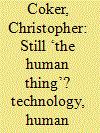

|
|
|
|
|
| Summary/Abstract |
Is war beginning to escape human control? Thucydides tells us the war is one of the things that makes us definitively human; but how long will this continue to be the case as our relationship with technology continues to develop? Kenneth Waltz’s book Man, the State and War affords one way of answering that question. So too does Nikolaas Tinbergen’s framework for understanding human behaviour and Bruno Latour’s Actor–Network Theory (ANT). The main focus of this article is the extent to which we will diminish or enhance our own agency as human beings, especially when we come to share the planet with an intelligence higher than our own.
|
|
|
|
|
|
|
|
|
|
|
|
|
|
|
|
| 6 |
ID:
165017
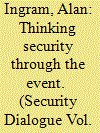

|
|
|
|
|
| Summary/Abstract |
While the turn towards materiality over the course of the last decade has enriched studies of security in a variety of ways, the security field continues to pose challenges for materially oriented thinking. This article argues that while recent materially oriented work on security has been concerned with events, working through the question of the event as a central analytical strategy is a promising way of addressing such challenges and developing broader insights. The article develops this argument by working through a particular event, the killing of the former Russian security agent Alexander Litvinenko in London in 2006 by means of the radioactive element polonium 210. Approaching the event via the archive and report of the public inquiry that subsequently took place into it, and reflecting further on the utility of Bruno Latour’s idea of dingpolitik for materially oriented work on security, the article explores transformations of materiality, politics and publicity, and draws out how polonium 210 came to figure in the killing and the inquiry as actant, trace and evidence. In conclusion, the article reflects on the conceptual value of working through events and the methodological issues raised in the analysis.
|
|
|
|
|
|
|
|
|
|
|
|
|
|
|
|
| 7 |
ID:
148790
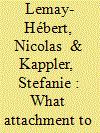

|
|
|
|
|
| Summary/Abstract |
The peacebuilding and academic communities are divided over the issue of local ownership between problem-solvers who believe that local ownership can ‘save liberal peacebuilding’ and critical voices claiming that local ownership is purely a rhetorical device to hide the same dynamics of intervention used in more ‘assertive’ interventions. The article challenges these two sets of assumptions to suggest that one has to combine an analysis of the material and normative components of ownership to understand the complex ways in which societies relate to the peace that is being created. Building on the recent scholarship on ‘attachment’, we claim that different modalities of peacebuilding lead to different types of social ‘attachment’ – social-normative and social-material – to the peace being created on the part of its subjects.
|
|
|
|
|
|
|
|
|
|
|
|
|
|
|
|
|
|
|
|
|